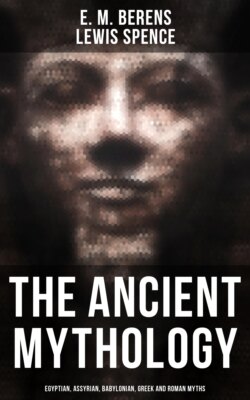Читать книгу The Ancient Mythology: Egyptian, Assyrian, Babylonian, Greek and Roman Myths - Lewis Spence - Страница 41
На сайте Литреса книга снята с продажи.
Connexion with the Jonah Legend
ОглавлениеSome mythologists see in the story of Jonah a hidden allusion to the circumstances of Babylonian cosmology. Jonah, as we remember, was summoned to Nineveh to prophesy against it, but proceeding instead to Joppa (the scene of the later myth of Perseus and Andromeda) the ship in which he set sail was storm-tossed, and he himself advised the sailors to cast him overboard. They did so, and "a great fish" swallowed him. This 'fish,' it has been claimed, is merely a marine form of Tiawath, the dragon of chaos, and the three days and nights which Jonah remains inside it are "the winter months."7 This does not seem very clear. Hercules in like manner descended into the belly of a fish and emerged again after three days, according to the Phœnicians. The name of Jonah may be compared with that of Oannes or Ea. The love-god, in the Hindu Vishnu Purana, thrown into the sea, is swallowed by a fish, like the ring of Gyges. Was there a local sea-monster at Joppa, a variant of Tiawath, and is it the same in the Jonah myth as that in the tale of Perseus? A tawny fountain at Joppa was thought to derive its colour from the blood of the sea-monster slain by Perseus, says Pausanias. Was then the monster who lay in wait off Joppa, Tiawath the goddess of darkness, and was Jonah none other than Ea or Oannes, her mortal foe, the god of light, whom she would mythologically swallow during the sere months of winter?
1. Another spelling is Tiamat.
2. Sayce, Hibbert Lectures, p. 374.
3. Of whom we now hear for the first time.
4. In many mythologies we find the gods praying and sacrificing to one another, and even to deities presumably higher than themselves and unknown to man or only guessed at by him. Thus the Vedic gods are constantly sacrificing one to the other, and there are many American instances of this worship of god by god.
5. See Pinches, The Religion of Babylonia and Assyria, p. 39.
6. This account has been claimed as a weak version of that part of the creation story which deals with the creation of the host of the abyss. The fact that Nergal states that he destroyed these monsters might justify us in believing that the myth was on this occasion so edited as to provide the monarch with an opportunity for boasting.
7. Bible Folk Lore, London, 1884. Anonymous.
